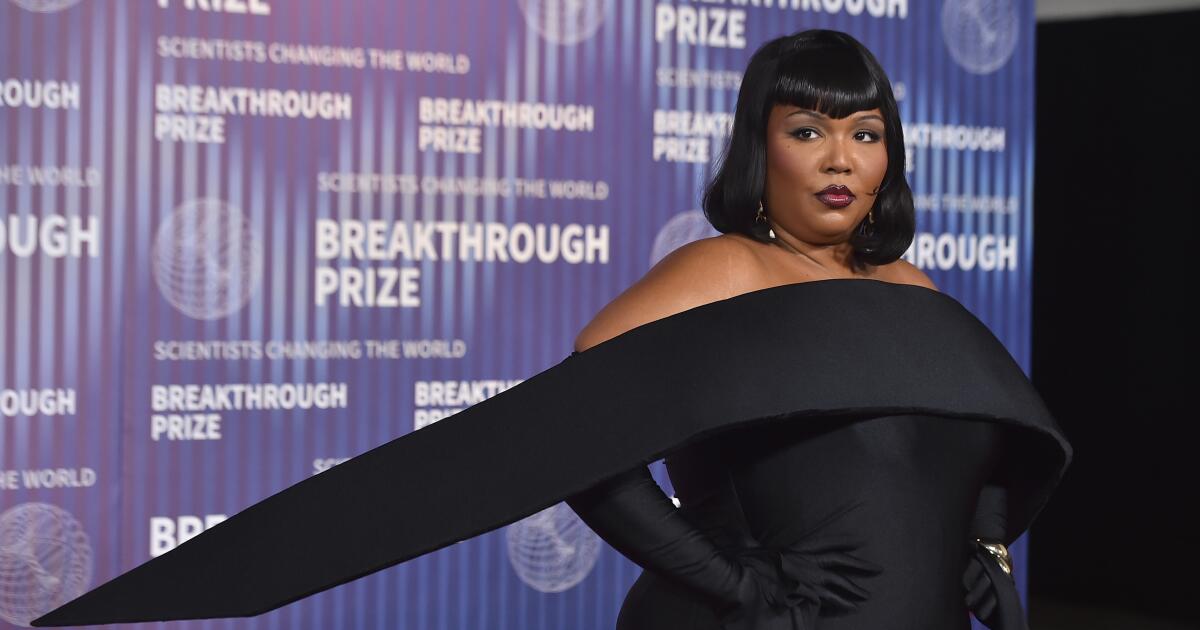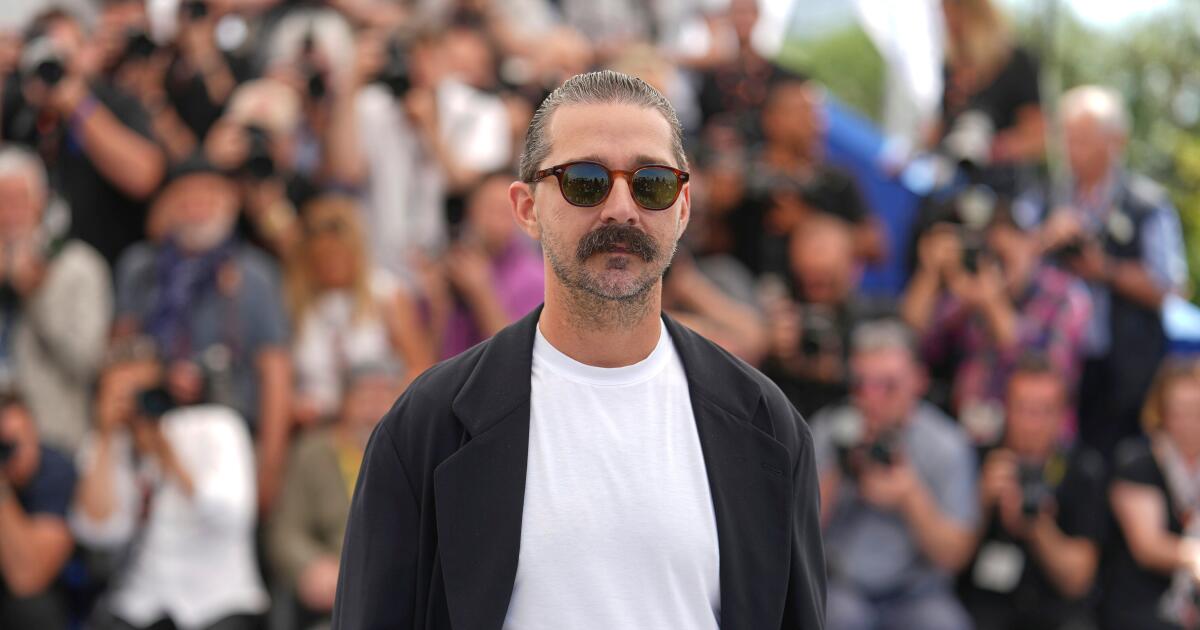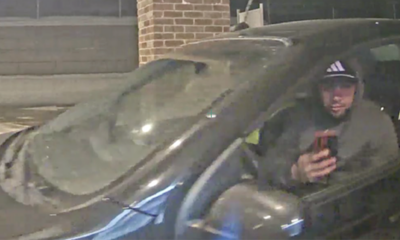Entertainment
Lizzo denies sexual harassment allegations from ex-dancers: 'I did nothing wrong'

Lizzo is getting frank about how a landmark year in her career has turned into one of its most fraught.
The “About Damn Time” hitmaker was fresh off of her first arena run last summer when three of her former touring dancers filed a sweeping harassment lawsuit against her, her touring company and her dance captain. A month later, fashion designer Asha Daniels, who worked on costumes for Lizzo’s tour dancers, filed a harassment and discrimination lawsuit of her own.
“I was literally living the dream,” Lizzo said Thursday on the “Baby, This is Keke Palmer” podcast — her first interview since the lawsuit news broke. Days later, she was “blindsided” by a slew of allegations she said “came literally out of nowhere.”
The four-time Grammy winner said she was “very hurt” because the dancers who filed the suit “were people that I gave opportunities to,” whom she “liked” and “respected.”
Lizzo said her legal team plans to fight until all claims against her are dismissed.
In August 2023, dancers Arianna Davis, Crystal Williams and Noelle Rodriguez filed a complaint alleging they were the victims of a hostile work environment and several forms of harassment while employed by Lizzo.
“It’s really hard to believe that somebody that you almost think could do no wrong, did so much wrong,” Williams previously told The Times. “I felt the need to even come forward publicly because this is not only her that does things like this. This is normalized in the entertainment industry in general.”
Among the dancers’ allegations in the ongoing case is that the Yitty founder “pressured Plaintiffs and all her employees to attend outings where nudity and sexuality were a focal point,” according to their complaint. Citing specific anecdotes from burlesque club Crazy Horse Paris and Bananenbar Amsterdam, which calls itself an “erotic bar,” the dancers recalled going along with Lizzo’s invitations to engage with nude club dancers out of fear of losing their jobs.
Lizzo said Thursday that she had merely been enjoying nights out with her team members, with whom she typically maintains friendly relationships. Attending the outings wasn’t “mandatory,” she said, and everything that occurred at them was “consensual.”
“We met the dancers, we laughed, we talked,” she told Palmer about the night at Crazy Horse Paris. “There’s photos and videos of the three girls who are the ex-dancers, who are suing me, in a video with them smiling, having a great time. And we all went back to our hotels. And that is one of the claims of sexual harassment.”
Lizzo said she used to struggle to understand why her music peers kept such distance from their crew, “but now I see why.”
“I think this experience taught me how to set those kinds of boundaries, not just to protect them, but to protect myself,” she said.
As for Davis’ claim that Lizzo body-shamed her and implied that her weight gain was a sign of her being “less committed” to her work, the “Truth Hurts” singer told Palmer, “Those words never came out of my mouth.”
“More things that just never happened,” according to Lizzo, include the singer “cracking her knuckles, balling her fists” and launching perceived threats after Rodriguez announced her resignation, as the dancer alleged in the lawsuit.
“This is the part of fame that you unknowingly sign up for,” Lizzo said. “People now will just believe anything bad about you.”
The dancers’ attorney Ron Zambrano addressed Lizzo’s comments Thursday in a statement.
“There is an utter lack of awareness by Lizzo failing to see how these young women on her team who are just starting their careers would feel pressured to accept an invitation from their global celebrity boss who rarely hangs out with them,” Zambrano said.
“There is a power dynamic in the boss-employee context that Lizzo utterly fails to appreciate,” he continued. “We stand by the claims in the lawsuit and are prepared to prove everything in court with Lizzo on the stand under oath before a jury of her peers, not spouting nonsense and lies rationalizing a failure to take accountability on a podcast.”
Separately, Zambrano corrected Lizzo’s statement on the podcast that Daniels’ separate suit had been “dismissed.”
A federal judge earlier this month ruled that Daniels could not sue Lizzo as an individual, but the singer’s touring company remains a defendant in the case, BBC reported. The judge also dropped several claims pertaining to Daniels’ work for Lizzo in Europe, where U.S. labor laws do not apply.
However, “The lawsuit is still very active and has not been dismissed,” Zambrano said in a statement published by People. “The ruling was not for lack of evidence, but rather on procedural jurisdictional grounds. It by no means absolves Lizzo of the egregious claims that occurred on her watch.”
A hearing in the dancers’ case is scheduled for Jan. 14.
Meanwhile, Lizzo told Palmer she remains someone who uplifts Black women and takes accountability when she makes mistakes.
“I still believe women. I still believe victims. Because this happened to me is not going to change that,” she said. “But people should not be able to just say anything about somebody and put it in the media and ask for money.”
The singer added that she’s been processing the events of the past year as she writes her new album, which has yet to be formally announced. “I’m putting everything in the art. I always have.”
Times staff writers Alexandra Del Rosario, August Brown and Stacy Perman and former Times staff writer Carlos De Loera contributed to this report.

Movie Reviews
Vishnu Vinyasam Movie Review – Gulte

2.5/5
01 Hrs 59 Mins | Romantic Comedy | 27-02-2026
Cast – Sree Vishnu, Nayana Sarika, Satya, Brahmaji, Praveen, Murali Sharma, Srikanth Iyyengar, Satyam Rajesh, Srinivasa Reddy, Goparaju Ramana and others
Director – Yadunaath Maruthi Rao
Producer – Sumanth Naidu G
Banner – Sree Subrahmanyeshwara Cinemas
Music – Radhan
Since 2023, with three commercial hits and one critically acclaimed film, Sree Vishnu has established himself as a minimum guarantee hero and built a loyal audience. To continue the success streak, he chose yet another romantic comedy film, directed by debutant Yadunaath Maruthi Rao. ‘Aay’ fame, Nayana Sarika, played the female lead role and Radhan, scored the music for the film. After creating enough curiosity among the audience with the teaser and trailer, the film was finally released in theatres today. Did Sree Vishnu, deliver yet another hit with a romantic comedy film? Did Nayan Sarika, score a hit in Telugu, after AAY & KA? How does the debutant director, Yadunaath Maruthi Rao, do? Did the music director, Radhan, come up with memorable songs and score? Let’s figure it out with a detailed analysis.
What is it about?
Vishnu(Sree Vishnu), works as a junior lecturer at a college, where Manisha(Nayan Sarika), works as the head of the department(HOD/faculty). Manisha, with her eccentric characteristics, intrigues Vishnu and both of them eventually fall in love with each other. When everything is going well for the couple to get married, Manisha informs Vishnu about a flaw in her Jathakam. What was the Dosham(flaw) in Manisha’s jathakam? How did it impact her prospects of getting married before meeting, Vishnu? Why did Vishnu initially get reluctant to marry Manisha, after hearing about her Jathaka Dosham? Will the couple sort out all the issues and get married eventually? Forms the rest of the story.
Performances:
Sree Vishnu, with his comedy timing generated a few fun moments that worked in favour of the film. However, in an attempt to appear effortless, he went overboard at times and appeared monotonous at a few places. Nayana Sarika got a good role and she delivered a good performance. She looked good throughout the film and appeared confident.
Satya, got a full-length role and he was able to generate a few laughs here and there with his comedy timing. Srikanth Iyyengar’s performance looked over the top and his portions looked rushed and very artificial. Srinivasa Reddy played a role similar to Mallikarjuna Rao’s role in Raviteja’s movie, Venky. He did an ok job but it seemed like he did dub for his role in the film? The film had Brahmaji, Praveen, Murali Sharma, Satyam Rajesh, Goparaju Ramana and a few others, in character roles. All of them made their presence felt but none of their roles gave the desired impact and extra mileage.
Technicalities:
Cinematography by Sai Sriram, is a major plus to the film. The visuals looked colourful, vibrant and gave a pleasant look to the film throughout. Radhan’s music should have been better. The songs scored by him were below par and the background score was pretty standard. Editing by Karthikeyan Rohini, was alright. He tried to cut the film with a very crisp runtime of around two hours and yet, ended up having a few repetitive sequences. Production values by, Sree Subrahmanyeshwara Cinemas, were decent and were within the limitations of a midrange romantic comedy film. Let’s discuss the work of the writer and the director, Yadunaath Maruthi Rao, in detail in the analysis section.
Positives:
1. First Half
2. Comedy Portions
3. Sree Vishnu & Satya’s Timing
4. Cinematography
Negatives:
1. Second Half
2. Lack of Strong Emotions
3. Music
Analysis:
The debutant writer and the director, Yadunaath Maruthi Rao, wrote a so-called peculiar characterisation of the female lead in the film and tried to generate enough fun moments using the comedy timing of his lead actor, Sree Vishnu and the lead comedian, Satya. Right from the word go, the writer intended only to make the audience laugh at any cost, and in doing so, he succeeded in parts but would have done a better job in other parts, especially the latter part of the second half. The film had at least five to six notable actors but for some reason, the director only concentrated on generating fun by using his lead actor.
The entire first half of the film unfolded without any major complaints. There were enough comedy sequences in the first half that engaged the audience in a fairly decent manner and the revelation of the conflict point during intermission, worked as well. However, after the initial few minutes of the second half, the film got into repetitive mode and the drama during the last thirty minutes was the film was written and executed in a very unexciting manner without any proper emotional depth. The twist during the climax was very predictable and it was narrated in a bland and rushed manner. Better care in writing and execution during the second half would have elevated the film’s overall graph.
The bare minimum that the audience expects from debutant writers and directors is original characters and characterisations, isn’t it? In Vishnu Vinyasam, to a crucial character, it was surprising to see a debutant director use the characterisation of ‘Jagadamba Chowdary’, a character from Ravi Teja’s movie Venky. Also, at just around two hours of runtime, the film makes the audience feel monotonous with a few repetitive sequences. One of the major negative points of the film is the songs. For a romantic comedy film to work, it is necessary to have at least one or two chartbuster songs. Unfortunately, none of the songs composed by, Radhan, helped the film in any way.
Overall, the core point of, Vishnu Vinyasam, has enough potential to become a very engaging romantic drama film. But, the half-hearted effort from the writer, director and the music director, ended up making it a decent watch. You may give it a try watching for a few well-executed comedy portions, Sree Vishnu and Satya’s timing.
Final Verdict – Partly Entertaining
Rating – 2.5/5
Related
Entertainment
Shia LaBeouf to undergo judge-ordered rehab after Mardi Gras incident

Actor Shia LaBeouf’s raucous Mardi Gras episode in New Orleans earlier this month has now earned him court-ordered drug and alcohol treatment.
A New Orleans judge on Thursday ordered the former Disney Channel star, 39, to begin substance abuse treatment and undergo weekly drug testing after he was arrested on suspicion of assaulting two men in the city’s famed French Quarter. He was charged with two counts of simple battery, the Associated Press reported.
“Transformers” and “Honey Boy” actor LaBeouf agreed to the updated terms of his release, including posting bond of $100,000, and underwent a drug test during his court appearance on Thursday. His attorney said the test did not show illegal substances in the actor’s system.
Orleans Parish Criminal Court judge Simone Levine criticized LaBeouf for his behavior during the Mardi Gras celebrations. In addition to striking the two men at a bar, LaBeouf allegedly yelled homophobic slurs. Levine expressed concern for “the safety of this larger community” and said LaBeouf “does not take his alcohol addiction seriously.”
A legal representative for LaBeouf did not immediately respond to a request for comment but said during the actor’s court appearance that “being drunk on Mardi Gras is not a crime.”
The actor has yet to enter a formal plea to the charges.
The New Orleans Police Department said its officers responded to a report of an assault in the 1400 block of Royal Street. The former “Even Stevens” child star was “causing a disturbance” at the business, leading staff to remove him from the premises, police said. The actor allegedly “used his closed fists” on one of the victims “several times.”
Authorities said LaBeouf left the business but returned, “acting even more aggressive.” According to the incident report, an unspecified number of people tried to subdue him and eventually let him go “in hope that he would leave.” Instead, police said, LaBeouf began assaulting the same man as before, hitting his upper body with closed fists. The actor is accused of punching the second man in the nose.
People held down LaBeouf until officials arrived. He was transported to a hospital and treated for unknown injuries and was arrested and charged upon his release.
An additional police report identified a local entertainer as one of LaBeouf’s alleged victims. The “Megalopolis” actor, whose history of violent behavior has led to previous arrests and other legal troubles, allegedly threatened the man’s life and shouted homophobic slurs.
Levine ordered that LaBeouf refrain from contacting the two victims and visiting the bar at the center of the brawl. She also denied his travel requests.
Hours after news of the brawl and his arrest spread, LaBeouf issued a brief statement on social media.
He posted to X: “Free me.”
Movie Reviews
‘Scream 7’ Review: Neve Campbell Returns for a Back-to-Basics Sequel That’s a Little Too Basic

The “Scream” movies, at their best, are delectable booby-trapped entertainments, and part of that is how cleverly they stay a step ahead of us. But there’s a moment in “Scream 7” that typifies the sensation this new movie gives you: that it’s leading the audience and lagging behind it at the same time.
We’re watching a homicidal pursuit through the home of Sidney Prescott (Neve Campbell), who is not only back but once again the central character (let’s call her the Final Girl as Mom). Sidney and her teenage daughter, Tatum (Isabel May), a kind of Final Girl in Training, are attempting to elude the blade of Ghostface. There’s a good bit where they inch along a catwalk behind the living-room wall, with Ghostface stabbing it from the other side. He misses, and they wind up on the street outside, where the killer gets smashed by a car that comes barreling out of nowhere (the driver, in fact, turns out to be an old friend).
The killer’s costume-shop Edvard Munch mask gets pulled off, revealing his identity, and this is followed by some chatter about how Ghostface often turns out to be more than one person. You don’t say! Considering that we’re only 45 minutes into the movie, that’s kind of a super duh. “Scream 7” is inadvertantly revealing its true theme, which is: Does anyone even care anymore who Ghostface is? Once all the obvious suspects have been eliminated, the answer is destined to be as arbitrary as it is forgettable.
The last two “Scream” films were nothing if not busy — nearly antic at times, stuffed to the bloody gills with backstory and mythology and schlock trivia. Yet there’s no denying that that was part of what kept the pulse of the series alive. In the lead-up to “Scream 7,” however, the busy quality seemed to transfer over to the drama offscreen: the firing of Melissa Barrera after comments she made that some judged to be antisemitic; the bowing out of Jenna Ortega; the fight over Neve Campbell’s salary (she sat out “Scream VI”); the fact that the directors who’d taken over the franchise, Matt Bettinelli-Olpin and Tyler Gillett, opted out, and their replacement, Christopher Landon, then quit after he started getting death threats over Barrera’s firing.
As if to calm the waters, the reins were handed back to Kevin Williamson, who 30 years ago wrote and created the original “Scream.” He was the series’ true auteur: the one who devised the whole concept of a meta slasher movie, a trash thriller maze that would be equal parts straight horror and a hack-’em-up version of Trivial Pursuit.
But Williamson returns to the “Scream” franchise, now directing one of the films for the first time, with a weirdly restricted agenda. The whole slaughter-movie scholarship side of the “Scream” films — “Look! We’re deconstructing the prospect of our own deaths like horror-film-class geeks!” — has basically been played out. And the series is all too aware of that. Williamson knows that he can’t just go back to that age-of-VHS ’90s drawing board. So what he’s done instead is to return the series to its “roots” in a straightforward, analog, Jamie Lee Curtis-in-the-rebooted-“Halloween”-franchise sort of way. “Scream 7” has enough shocks and yocks to keep the product churning and the audience, at least for a weekend, turning out. Williamson has gone back to basics, but the result is a “Scream” sequel that, while it nods in the direction of being seductively convoluted, is really just…basic.
The teenage Tatum, named for Sidney’s late lamented bestie (the Rose McGowan character from the original “Scream”), has a boyfriend, Ben (Sam Rechner) who smirks too much, along with a minor circle of friends who could all, theoretically, be suspects. But they get bumped off with a regularity that lets us know the mystery is elsewhere. One of the murders is a grisly piece of showmanship: Hannah (Mckenna Grace), flying around on a harness as she rehearses the high-school play, gets slashed with Ghostface’s knife until her innards fall out. But that scene is the exception to the film’s rule of routine “sensational” killings. Simply put, “Scream 7” isn’t very scary, and it isn’t very inventively gory (which some of the sequels have been).
The film opens with a fun variation on the ritual Ghostface phone call: Scott and Madison (Jimmy Tatro and Michelle Randolph) are visiting the former home of Stu Macher, which has been turned into a slasher museum. Among the nostalgic artifacts is a life-size Ghostface model that turns its head via movement sensors. Roger L. Jackson is once again the voice of Ghostface (the aggro psycho as AM radio DJ), and all of this erupts into a satisfyingly incendiary prelude.
But once “Scream 7” settles into its main story, Williamson adopts a tone of mordant sincerity regarding Sidney and the trauma she can’t seem to outrun. Courteney Cox’s Gale Weathers shows up, and she too becomes a major player, though the “media” commentary is strictly pro forma. The film has better luck reviving Matthew Lillard’s Stu, a character we were certain was dead‚ and he may in fact be. But then how is Stu, with mottled skin, calling up Sidney and conducting threatening live video-phone chats with her? Lillard’s raging performance could almost be his answer to Quentin Tarantino’s dis of him. The actor, like the character, is saying, “I’m still here,” and that’s true even if Stu is just a deepfake.
As Mindy, the aspiring TV news reporter who’s working for Gale, Jasmin Savoy Brown gets to deliver the film’s few token snippets of horror-snob geekery, and she’s so good at it that she made me wish Williamson had included more of it. Maybe the reason this stuff got so played out is that the series, creatively speaking, could actually use a more expansive vision of what horror movies are. But that’s not about to happen, because the “Scream” films are so successful they’re now effectively trapped in a genre that can’t risk being too smart about playing dumb.
-

 World1 day ago
World1 day agoExclusive: DeepSeek withholds latest AI model from US chipmakers including Nvidia, sources say
-

 Massachusetts2 days ago
Massachusetts2 days agoMother and daughter injured in Taunton house explosion
-

 Montana1 week ago
Montana1 week ago2026 MHSA Montana Wrestling State Championship Brackets And Results – FloWrestling
-

 Oklahoma1 week ago
Oklahoma1 week agoWildfires rage in Oklahoma as thousands urged to evacuate a small city
-

 Louisiana4 days ago
Louisiana4 days agoWildfire near Gum Swamp Road in Livingston Parish now under control; more than 200 acres burned
-

 Technology6 days ago
Technology6 days agoYouTube TV billing scam emails are hitting inboxes
-

 Denver, CO2 days ago
Denver, CO2 days ago10 acres charred, 5 injured in Thornton grass fire, evacuation orders lifted
-

 Technology6 days ago
Technology6 days agoStellantis is in a crisis of its own making



















